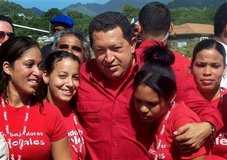Dagens Chávez tjatar om det här med IMF och Chávez strategi för Latinamerika. Men det är viktigt. För att förstå varför Chávez ses som ett "hot" och demoniseras av ni vet vilka. Och för vikten av att alla progressiva krafter då och då lyfter blicken (från t.ex och iofs intressanta diskussioner om Hugo Chávez personliga gudstro, yrkesbakgrund etc) och inser Venezuelas betydelse för regionen i stort. Mark Weisbrot förklarar bra.
For example, before the Nicaraguan elections last November, US government officials made many threats to the voters of that country that if they elected Daniel Ortega, they would suffer greatly from cutoffs of loans, aid, and even the remittances that many Nicaraguans depend upon from their relatives in the United States. None of these threats have been carried out. This is partly because Washington knows it would be useless and counterproductive to do so, since Nicaragua would simply replace US-controlled funding sources with more borrowing from Venezuela. The same is true for Bolivia, which has vastly increased its hydrocarbon revenues, and is in a stronger bargaining position knowing that it has an international lender that will not try to interfere with its domestic political agenda. The new progressive president of Ecuador, who faces a number of important political battles to deliver on his promises of governmental reform, pro-poor and pro-development policies, is also strengthened by having Venezuela as a lender. When the Argentine government decided to say goodbye to the IMF in January of 2006 by paying off their remaining $9.9 billion in debt, Venezuela’s loan of $2.5 billion helped that government to avoid pushing its reserves down to dangerously low levels.
In all of these cases and more, Venezuela’s financial support is helping other governments to deliver on their promises to their own voters, thereby contributing not only to stability but to the strengthening of democracy in the region. Washington-sponsored aid, by contrast, has often had the opposite effect – provoking "IMF riots," and sometimes economic crises (e.g. the 1998-2002 Argentine depression), by trying to impose policies that were deeply unpopular and, as we now know, economically flawed.
Venezuelas generösa och offensiva regionala strategi baseras på den bolivarianska tanken om ett enat Latinamerika. Men Venezuelas ställning i närområdet är också avgörande för landets ekonomiska och politiska framtid. USA kommer inte upphöra med sina försök att destabilisera och isolera ett självständigt Venezuela.













